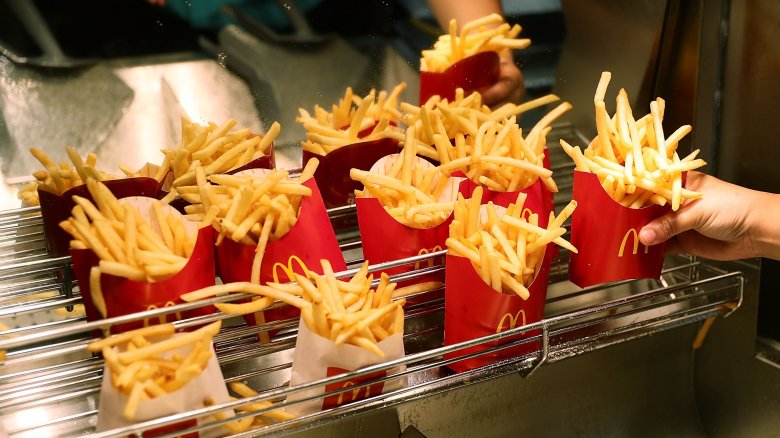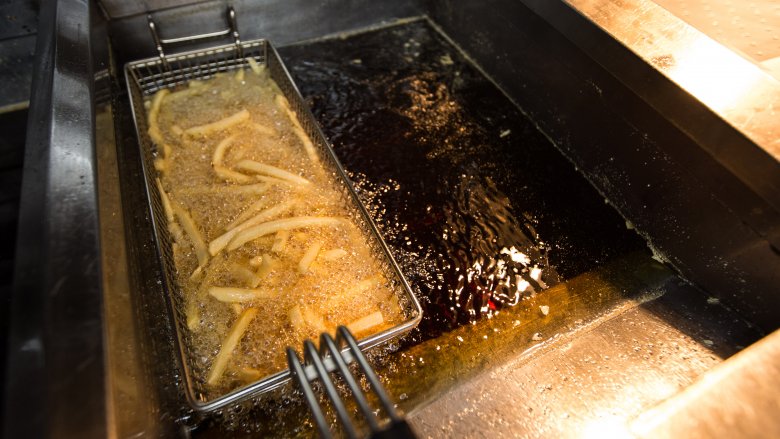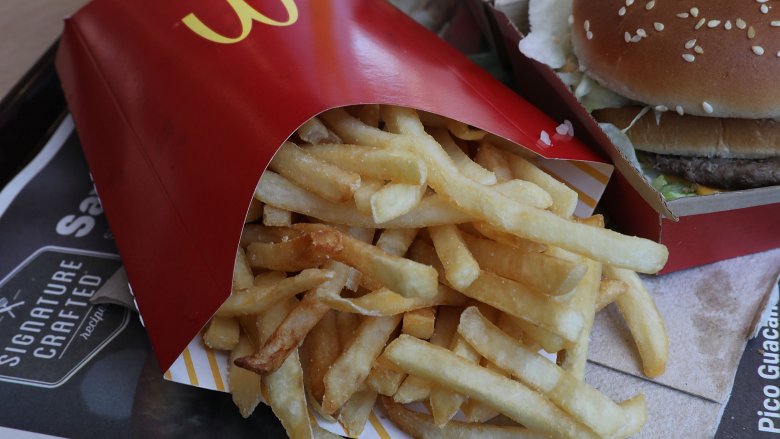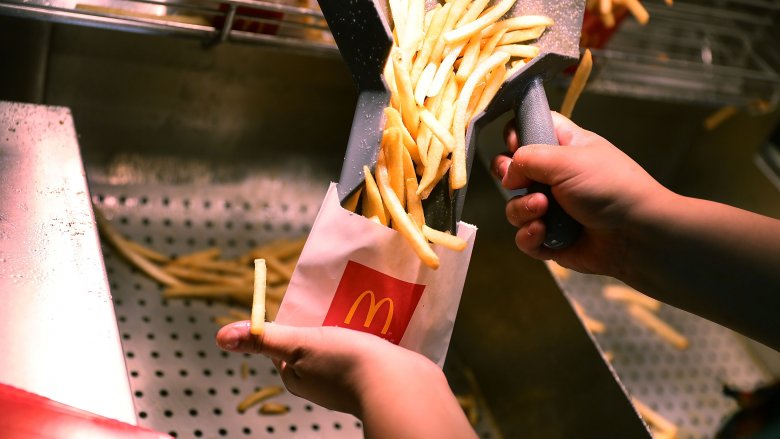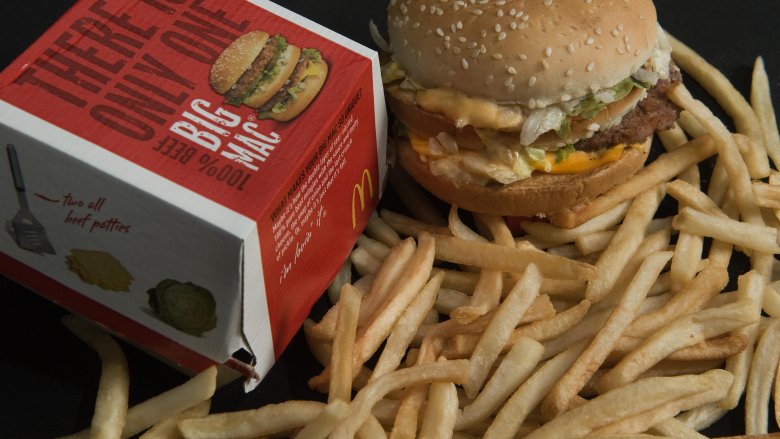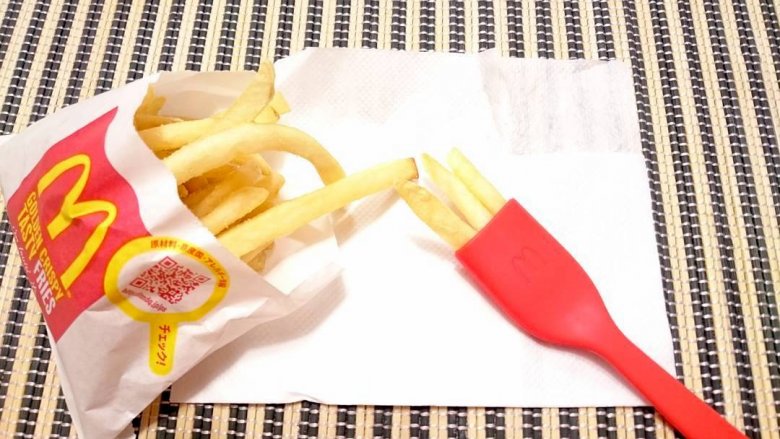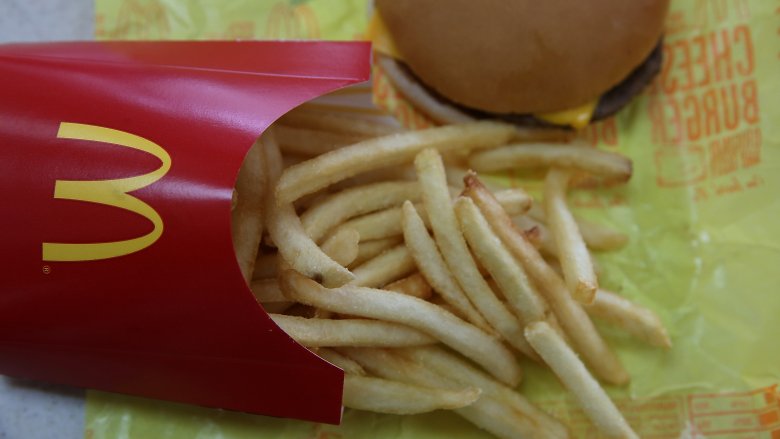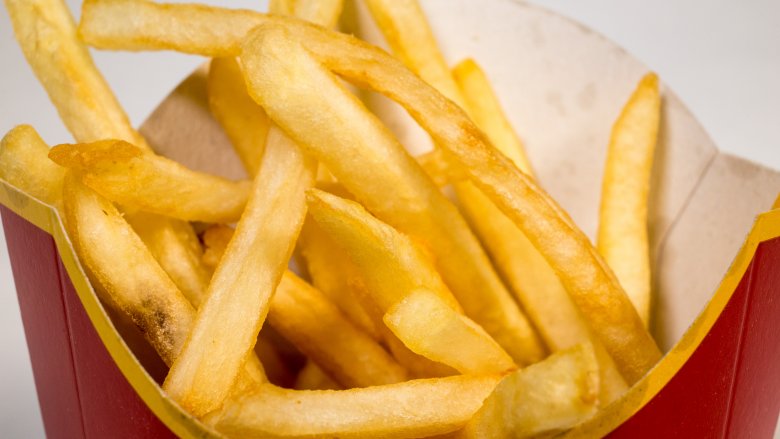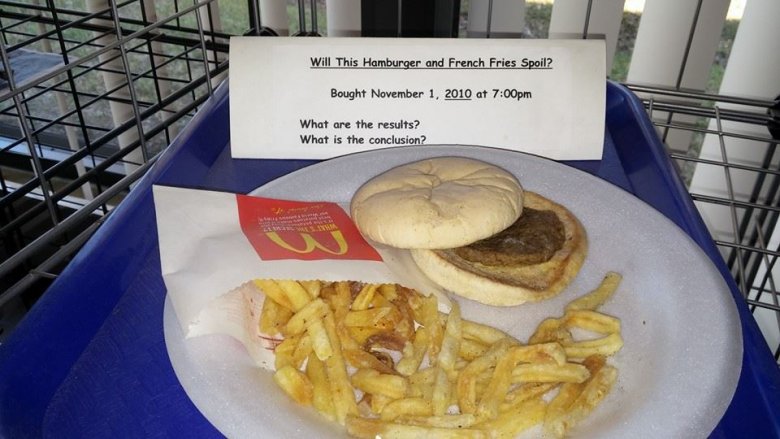The Untold Truth Of McDonald's Fries
McDonald's french fries are arguably the best fast food item ever invented. With their perfectly crisp exterior, and soft, pillowy interior, it's hard to come up with a superior menu choice, no matter how much you love a Big Mac, Filet-O-Fish, or Chicken McNugget. You probably fell head over heels in love with the delightfully salty treat decades ago, when you opened your first Happy Meal box in the back seat of the car and plunged your hand into the paper wrapper full of hot, fresh fries. And chances are, your love affair has been going strong all these years.
But even lifelong admirers of McDonald's french fries might not know everything there is to know about the iconic fast food. Along with a surprising ingredient, there are also surprising claims about the benefits of a diet rife with fries from the Golden Arches. Are they really a magical curative balm? Let's find out.
They're not vegetarian
Vegans and vegetarians might assume that deep fried potatoes are a safe option among a menu full of chicken and beef, but if you're noshing at a McDonald's in the states, that's not the case.
In 2015, when former MythBuster Grant Imahara was tapped to uncover what really goes into making McDonald's fries, one ingredient in the list of 19 stood out from the rest: natural beef flavor. Prior to that, in 2001, a lawsuit was brought against McDonald's by two Hindu vegetarians who alleged that the restaurant made fraudulent claims by serving french fries flavored with animal products without informing customers. McDonald's argued that they'd never claimed their fries were vegetarian, and had the ingredient list available on request. At the time, however, the ingredient was listed simply as "natural flavor," which does include beef flavoring. You can see how that could get a bit confusing.
So, now that it's listed more clearly as "natural beef flavor," what does that really mean? The McDonald's website notes, "When our suppliers partially fry our cut potatoes, they use an oil blend that contains beef flavoring. This ensures the great-tasting and recognizable flavor we all love from our World Famous Fries." According to Eater, who spoke to food chemist Gary Reineccius, in some cases natural beef flavor may actually be vegetarian, though McDonald's makes no claim that theirs is. In any case, even if they are vegetarian, they're definitely not vegan as they contain hydrolyzed milk.
What about the other 18 ingredients?
A whopping 19 ingredients (potatoes, canola oil, soybean oil, hydrogenated soybean oil, natural beef flavor, hydrolyzed wheat, hydrolyzed milk, citric acid, dimethylpolysiloxane, dextrose, sodium acid pyrophosphate, salt, canola oil, corn oil, soybean oil, hydrogenated soybean oil, TBHQ, citric acid, dimethylpolysiloxane) make up McDonald's fries. It might sound shocking to hear, but after breaking it down, former MythBuster Grant Imahara has determined that they're not a "Franken-fry composed of chemicals" after all. How can that be?
For starters, many of the ingredients are listed twice, making the true count 14, and that's because the fries are fried in the same oil blend twice — once before freezing and again when you order them at the restaurant. We already know that the natural beef flavor (with hydrolyzed wheat and hydrolyzed milk) is added to achieve that consistent McDonald's french fry taste, and citric acid is an antioxidant used to preserve the freshness of the oil. The "scariest" sounding ingredient, dimethylpolysiloxane, is an anti-foaming agent which keeps the oil from splattering, and is approved for use in many foods. Dextrose is a sugar which helps maintain the color of the potatoes, along with sodium acid pyrophosphate which keeps them from turning gray. The last of the suspect ingredients, TBHQ, is another antioxidant which also helps preserve the freshness of the oil. As Imahara concludes, "McDonald's french fries are made with potatoes," they just need a little help along the way.
They taste different than they used to
It's not your imagination — although McDonald's fries are still downright delicious, they do taste different than they did years ago. So what changed? We know that our beloved fries are still cooked in an oil blend that has a small amount of natural beef flavor added, but prior to the early 1990s, they were actually cooked in beef tallow (or fat). The move to vegetable oil was made when consumers expressed concern over the amount of saturated fat in the fries.
Revisionist History podcaster, Malcolm Gladwell, dove deep into the subject and found the blame for this change lays mostly on a man by the name of Phil Sokolof, who spent millions campaigning against the saturated fat content of McDonald's menu items, among other food companies. Eventually, McDonald's caved to the pressure and stopped cooking their fries in beef tallow, but at the cost of some serious flavor. As Gladwell notes, "... they thought that fast food would be doomed unless it donned the cloak of good nutrition. Even though that's absurd. I mean, it's a french fry. It's never going to be a healthy product." Can we get an amen?
Can they help you get pregnant?
There is an endless supply of advice out there when it comes to what foods you should eat to increase fertility, but if you live in the UK, you might be pinning your hopes on McDonald's fries (or chips, to use the proper British term).
In advance of the UK's National Baby Making Day, Channel Mum conducted a survey to find out what methods couples employ to up their chances of getting pregnant. Among other more usual answers like "eat dark chocolate every day" and "eat pineapples" was a more surprising response: "Eat McDonald's chips immediately after sex." Three percent of those surveyed believe in the power of the french fry, and yes, it has to be McDonald's. The Bump reports that among the interwebs, the belief is that the high salt content in the fries "helps with fertilization because it prompts your body to soak up extra fluids." While that does sound fairly logical in theory, there is no actual science to back this claim up. But hey, McDonald's french fries after anything sounds like a great idea, so why not?
Are they a cure for baldness?
Move over Rogaine, McDonald's fries are the new savior of the bald. At least that's what all the sensationalized headlines would have you believe.
The story broke in February 2018 when a study on hair follicle growth touted the potential cure for baldness: dimethylpolysiloxane. A team of scientists discovered that the use of dimethylpolysiloxane, which happens to be the very same anti-foaming agent used in McDonald's fries, can successfully regrow hair on mice. So, a diet high in McDonald's fries can cure baldness, right?
Wrong (obviously), and we have the media to thank for that. Once the connection to the McDonald's fries ingredient was made, the stories ran rampant. But, sadly, there is no mention of McDonald's in the study, and simply consuming dimethylpolysiloxane (or copious amounts of fries) gets you nowhere. The silicone was used as a base to cultivate hair follicles, and it is definitely not an ingredient in a "recipe" for a cure. Still living on hope? According to The Japan Times, Junji Fukuda, the scientist who led the study, said, "I have seen online comments asking, 'how many fries would I have to eat to grow my hair?' I'd feel bad if people think eating something would do that!"
What the heck is a Frork?
McDonald's has launched some questionable campaigns in the past — the new and "improved" Hamburglar comes to mind — but in 2017 they really made the masses scratch their heads when they introduced the Frork. The utensil, part french fry, part fork, was promoted as being the answer to all of our fallen burger topping woes; particularly the Signature Crafted Recipe burgers introduced in conjunction with the Frork. Made of silicone, the user simply inserts french fries into the shaft, which act like tines to mop up all the saucey goodness left behind on your wrapper.
The Washington Post had a hard time nailing one of these limited edition utensils down, and surmised that it was all a ploy to get social media buzzing, which it definitely did, but based on Instagram posts, the #Frork was indeed a reality. It was only offered for one day though (and only in select restaurants), so if you missed your chance, you'll have to do things the old fashioned way — with your fingers.
They might be considered a weapon
You know that old trick where you blow the paper wrapper off your straw and into the face of your unsuspecting fellow diners? Try that with a french fry loaded in your straw instead and you might find yourself being shown to the back seat of a police car. That's what happened to one 13-year-old boy in England, anyway.
According to tabloid reports in The Sun, the boy loaded up his Mickey D's straw with french fry ammunition and fired it at a young woman dining nearby, hitting her in the face. The incident prompted a brawl to break out between the two groups of friends, and ultimately, after months of investigation, the french fry shooter was charged with assault "by using a straw to fire a chip, hitting her in the face." After two magistrate hearings, the charge was dropped when the boy accepted his caution. ("In England, a caution is not a criminal conviction, but you must accept guilt and it could be used as evidence of bad character if you go to court for another crime," according to Gov.UK.)
They're kind of healthy — for fries
If you're looking for health food, you're probably not hitting the drive-thru. But if you are hitting the drive-thru, you might want to know which fast food joint offers the "healthiest" french fries. Turns out, the Golden Arches are near the top of the list when it comes to having the lowest calories and bad fats. Cue the happy dance.
WebMD ranked french fries from 14 popular fast food chains, including McDonald's, to see how they rated nutritionally speaking. At 230 calories for a small fries, McDonald's came in second for lowest calories, just below Sonic Drive-In at 220 calories. Similarly, Mickey D's placed second for lowest fat (11 grams total compared to Sonic's 9 grams), and lowest bad fats (1.5 grams saturated and 0 trans fat, which ties with Sonic whose portion is just a little bigger thus giving them the edge).
More good news: Sonic may have made adjustments to their fries since the WebMD rankings were released. According to their website, their small fries now contain 250 calories and 12 grams of fat, meaning the Golden Arches can now boast the "healthiest" fast food fries — if that's a thing.
But why don't they rot?
We've all seen the claims, usually accompanied by pictures as proof, that McDonald's burgers and fries do not rot — not a speck of mold, not a change in appearance. Allegedly, the food is so full of chemicals and preservatives that it can not, will not, rot. Well, that's not exactly true...
All foods need certain things to rot, mold, or decay — moisture being one big factor. Without moisture, the microbes that cause rot cannot grow, and without microbe growth, you won't see those telltale signs that your burger and fries are past their prime. Because these foods start out relatively dry in the first place, it's not a huge leap to think that leaving them out in their paper wrappers, with no moisture source, would simply cause dehydration, not mold. In fact, an experiment run by Serious Eats proved that both a homemade burger and McDonald's burger grew mold when placed in a sealed plastic bag. Bottom line? Maybe you don't see evidence of rot, but that 6-year-old Happy Meal is definitely going to be hard as a rock.
